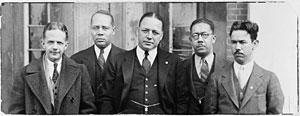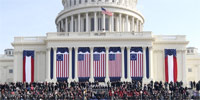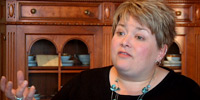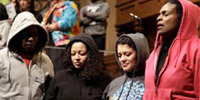Harold Dean Trulear: Judicial Activism, Judgment, and Middle America
The call and response rhythm of McCain and crowd achieved a comfortable, if predictable, pace on the final night of the Republican National Convention. Call out issue, respond with affirming applause (accompanied by that annoying “woo-woo” sound that I can never seem to–and, quite frankly, don’t really want to– make). The issues moved from the hot buttons of the economy and the war to the Republican brands of cutting business taxes and school choice. But one issue interrupted the rhythm and elicited a mighty chorus of ascent in an unexpected manner. The audience leapt to its feet and cheered wildly when its hero declared that he would appoint persons to the judiciary who did not legislate from the bench.
Whoa. A fresh dig at judicial activism. Why such an emotive response to an issue seemingly demoted to the second string by the varsity concerns of Iraq, oil prices, and homeownership? From what quarter arose such a raucous chorus of affirmation? One answer would be that the disaffected middle of American society, those to whom Sarah Palin spoke directly on Wednesday, needed to hear some familiar calls to arms. This would include the anti-abortionists (most of whom are just that–anti-abortionists; to be actually pro-life is to affirm the quality of life for children after birth on such issues as health care, education, and gun control that minimizes their chances of getting shot) who seek redress from the judicial activism of Roe v. Wade. This would include Christian conservatives who clamor for the return of prayer, and by implication God, to public schools. (N.B.: As long as there are math tests, there will be prayer in schools.)
The judicial activism hot button burns precisely because it bypasses the consensus reflected in the legislative process, and those who form the American consensus represent the target at which both parties aim in this election, though the Republicans made a much clearer and more direct appeal than their Democratic counterparts. The fight for the middle frames the bulk of what we will hear for the next two months. If you are a part of that pool of the poor and dispossessed, or a citizen battered by collateral sanctions that minimize your opportunities for employment, or someone who looks decidedly different than 99 percent of the faces we saw on TV for the past few days, don’t fret if there seems to be a disconnect between the speeches and your situation: they are not talking to you anyway.
No, this is about grabbing the self-interest of the middle, and to the extent that the middle interest can help the poor, so be it. When the interests of the dispossessed conflict with the interests of the middle, problems such as “judicial activism” arise. The interests of the middle included segregation and discrimination for most of this nation’s history, and it took appeal to the “activist” Warren Court to jump start an assault on an evil consensus in the form of Brown v. Topeka Board of Education in 1954. The middle never looked back on the Dred Scott decision and called it “judicial activism.” The middle never considered the decision of Plessey v. Ferguson to be judiciary intrusion on the legislative process. No, these decisions reflected a consensus of the middle embodied by its legislation.

Charles H. Houston and NAACP legal team |
To right the middle’s wrong on race, a civil rights lawyer by the name of Charles Hamilton Houston, dean of the Howard University Law School and head of the NAACP Legal Defense Fund, marshaled his best students–including Thurgood Marshall–and began a litigious path to the Supreme Court, stimulating a growing gap between the middle and the bench, the proposed closing of which drew wild applause last night. In a sense, the very judicial activism the middle now decries is the judgment against it for being wrong on race for so many years.
The great religious traditions of our nation all affirm care for the poor more so than the prosperity of the middle as benchmark of a people’s greatness. But the middle, the consensus, receives the attention for the next two months. Somehow, the middle consensus must expand to include justice for the poor and oppressed as a centerpiece, not just a member of the et.al. list concluding McCain’s acceptance speech to the middle last night. As long as the middle refuses to embrace the outcast as a central reality of the American dream, judgment looms, whether from benches or trenches, courts or creation, justices or just desserts, appointments supreme or Divine.
The agenda of the middle cannot fulfill the demands of justice. Our record on race, and the judicial activism it took to begin to fix it, should teach us so.
–Harold Dean Trulear is associate professor of applied theology at the Howard University School of Divinity.







